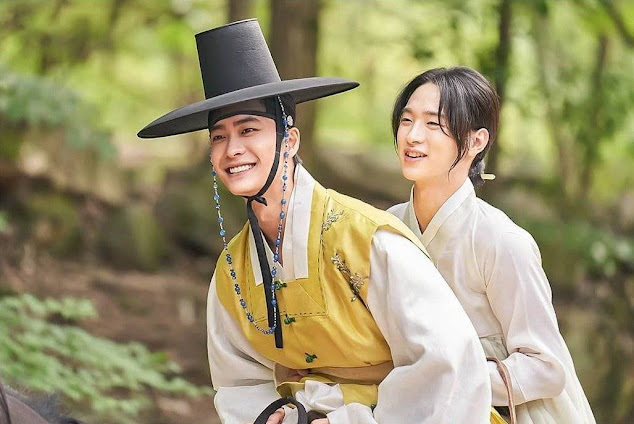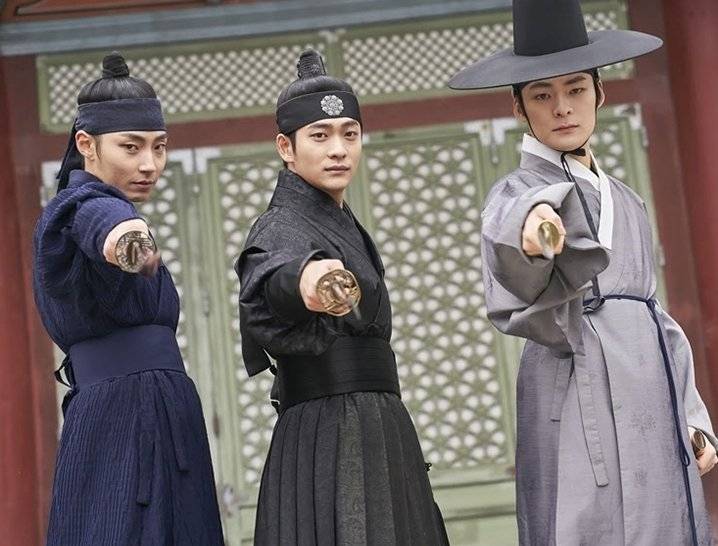So funny and yet emotional, with a strong dash of palace intrigue.
First, the acting gems: Jang Dong-yoon (Nokdu), Kang Tae-oh (Cha Yul-mu), Park Da-yeon (Aeng-du) and because she won a Best Actress award for this, Kim So-hyun (Dong-ju/Eun-seo)
Hearty congratulations to the people who discovered JDY. He brought Nokdu endearingly to life and shone as Lady Kim. Cross-dressing roles usually just don’t work on me but JDY was too hilarious as Lady Kim, so now I won't automatically sneer at cross-dressing characters. He easily made you root for the kind, strong, smart Nokdu as well as pretty, gentle and resourceful Lady Kim.
Park Da-yeon – amazingly funny at age 7! Her endless eating was hilarious and she played her role so competently.
KSH did well here. When I saw the early episodes of Moon Embracing the Sun, I thought her acting (playing a more complex character) eclipsed Kim Yoo-jung’s and I’m not surprised about her winning Best Actress awards but I felt that the other three outperformed her here.
Second, the secondary gems: I liked how every single secondary and minor character had a discrete personality – the gisaengs, the two trios of widows, Nokdu’s family, the ministers, soldiers, court ladies, even the characters in one-off scenes, such as the real Lady Kim, the lecherous man and the gangsters. Yeon Geon (played by Go Geon-han) was especially amusing. I was hoping he was an undercover agent faking his silliness and though it didn’t turn out to be so, he was a very funny and important addition to the network of Nokdu and Eun-seo supporters.
Third, the plot gems: loyalty and irony
All the usual sageuk themes were there – ambition, rivalry, family, friendship, courage and so on. For me, loyalty stood out, coming through not just the main characters but also through the widows, gisaengs and the people in the court, best epitomised in Dan-ho (played by Hwang In-youp) although you did wonder why he was so faithful to Yul-mu, to the extent of sacrificing his life for him.
The biggest irony was how the two babies (Nokdu and Yul-mu) born that day turned out to be the most significant guys in the story. Of course, that just makes the shaman’s prediction accurate and from the king’s position, it means both babies should have been killed…
What was up with the king? Sure, his mind was clouded by ambition and the need to hold on to the throne at all cost but why couldn’t he see that all his problems arose because he got on the throne the wrong way? Why did he trust Yul-mu so much when he couldn’t trust his most ‘trusted’ supporters and the Queen? Not surprising that he did himself in. His paranoia and mistrust made him easy meat for Yul-mu and even for the Queen Mother, who spent most of the show in the shadows. (What happened to her in the end?)
What was Yul-mu’s motivation? It seemed like he just wanted to be king but why, and why did the people who supported him support him? He was far more intelligent and organised than the king for sure but he didn’t have that strong a claim.
Why was it so easy for people to go in and out of the palace? It’s funny how soldiers were strictly guarding the entrance but there were these side and back gates/doors that were so easily breached. Nokdu didn’t have problems sneaking in and out, and Eun-seo could even enter while the big battle was going on!
What was the Queen’s status in the end? Why was she travelling to Nokdu and Eun-seo’s wedding on her own? Where was her attendant Court Lady Kim?
My two biggest questions:
What did Hwang-tae have in mind when he joined Yul-mu’s camp? It seemed such a random move and so out of character. Why was there a need to go to Yul-mu? Wasn’t that the path to more threats and troubles?
What was the whole point of Nokdu’s search for the truth, then? After going through all that and fighting so hard to protect his real dad the king who steadfastly refused to trust him, he goes back to island life! Also, I kept thinking that the dad should just tell Hwang-tae and Nokdu the whole sorry tale of Nokdu’s true parentage. They would then understand why strange people kept turning up to kill them. They were all competent fighters except for Hwang-tae (and why didn’t he learn some fighting skills?) and could have protected themselves (and Hwang-tae, which they did). Wouldn’t it be better to know than to keep moving to remote places?
A final question, from my aunty-ajumma mind: KSH wasn’t 21 yet when she did this show but all those kissing and ‘intimate’ scenes were alright for her?
Overall, it was an engaging plot with beautifully crafted scenes, both in terms of content as well as visuals. And all those hilarious scenes… definitely worth watching!
16 episodes, KBS











Comments